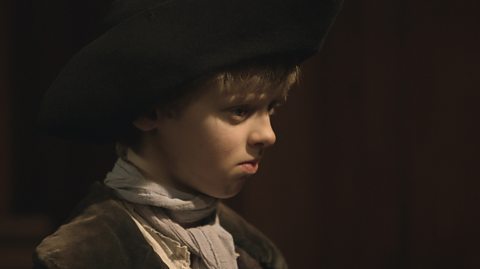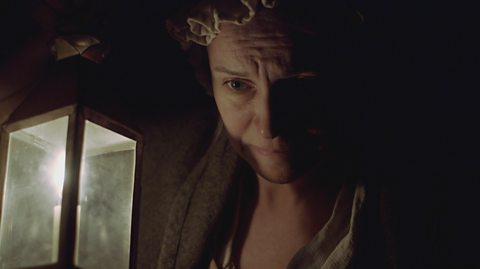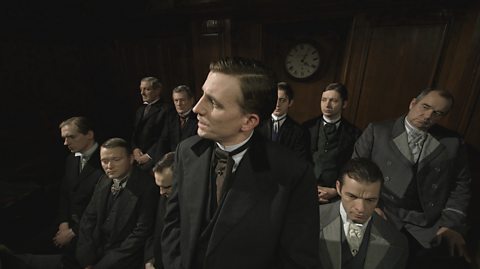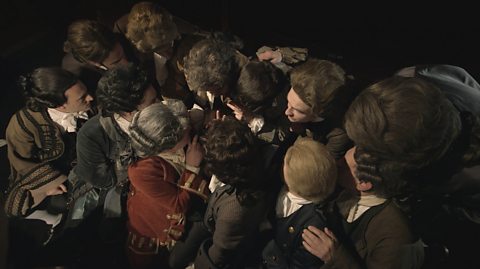COURT REPORTER:I am the court reporter.
COURT REPORTER:Since 1674, every trial that's been played out between these walls at London's Old Bailey court, every single one of them, has been faithfully recorded by a reporter like me.
COURT REPORTER:I sat just here.
COURT REPORTER:'I wrote down what was said by whom. And now you, some while later can listen in.
COURT REPORTER:'You can put your ear to the walls and hear once again these voices from the past.'
COURT REPORTER:Now here's a case that sends a shiver down the spine.
COURT REPORTER:'A grizzly crime. A dark deed indeed.
COURT REPORTER:'Even the dead it seems are not safe from thieves.'
COURT REPORTER:This is a case of body snatching. The dead, dug up.
COURT REPORTER:'The year, is 1843,
COURT REPORTER:'but it's a curious one this. As medical science blossomed, body-snatching had become such a concern that they introduced an act to set out a legal avenue for students to access corpses to aid the study of anatomy and disease.'
COURT REPORTER:That was 1832. 11 years later and up pops this mysterious case.
COURT ANNOUNCER:John White-Bridgeman and Isaac Bridgeman indicted for unlawfully breaking and entering the grave of Thomas Gaust-Tawny and taking away the said body.
COURT REPORTER:Here accused are a man of the church and his son. The minister and guardian, no less, to the very chapel where the crime occurred.
COURT REPORTER:The father, the son, and the holy, unholy business of the dead undone, and in the very place, where they should rest in peace.
PROSECUTOR:Gentlemen, we are here, are we not for such a fleeting time. And when our journey on this earth is done, when we go to meet our maker, what do we ask for but the simplest request?
PROSECUTOR:To rest in peace.
PROSECUTOR:Imagine then to discover that your family, duly laid to rest, found their peace, shattered.
PROSECUTOR:Their coffins forced open, their bones tossed asunder.
PROSECUTOR:I call my first witness. Mr. James Dodsley-Tawny.
MR. JAMES DODSLEY-TAWNY:I swear by almighty god that the evidence I shall give shall be the truth the whole truth and nothing but the truth.
PROSECUTOR:Mr. Tawny. Your family has a vault at the chapel of St. Johns, is that correct?
MR. JAMES DODSLEY-TAWNY:That’s correct. My father, the late Thomas Gaust-Tawny died in November of 1803 and was buried there.
MR. JAMES DODSLEY-TAWNY:My elder brother Thomas and my mother both died in 1837 and were buried in the same vault.
PROSECUTOR:Mr. Tawny please can you explain to the court how you came to discover that your family tomb had been disturbed.
MR. JAMES DODSLEY-TAWNY:I was at home on cheapside and I came in receipt of some information in consequence of which I went to the house of Mr. Bridgeman.
MR. JAMES DODSLEY-TAWNY:'I told Mr. Bridgeman I came there for the purpose of opening my family vault. He said nothing.
MR. JAMES DODSLEY-TAWNY:'I said "I will view my family vault" and I walked into the passage. Still Mr. Bridgeman said nothing to me.'
PROSECUTOR:'Could you describe what you found?'
MR. JAMES DODSLEY-TAWNY:'When I got to the vault I saw that the large stone at the top had been evidently moved and the brickwork damaged.
MR. JAMES DODSLEY-TAWNY:'When I looked inside I could see my mother's coffin was turned on its side and my father's coffin was gone.
MR. JAMES DODSLEY-TAWNY:'There were some pieces of wood lying at the bottom of the tomb and a patch of hair about the size of my hand.'
PROSECUTOR:Did you seek to speak with Mr. Bridgeman again?
MR. JAMES DODSLEY-TAWNY:I went directly back through the chapel and into Mr. Bridgeman's house not exceeding ten minutes after I'd first arrived.
MR. JAMES DODSLEY-TAWNY:I could not find Mr. Bridgeman.
PROSECUTOR:You then sought a warrant through appropriate channels to search the premises, correct?
MR. JAMES DODSLEY-TAWNY:Yes that's correct.
MR. JAMES DODSLEY-TAWNY:'When I had the warrant I went to the chapel yard. There I observed a spot where the earth had been recently removed.'
MR. JAMES DODSLEY-TAWNY:'It was 15 yards from the defendant's back premises.'
MR. JAMES DODSLEY-TAWNY:'I found three skulls, and in another spot quite close by, I found another skull.'
PROSECUTOR:On what grounds did you deduce then that some of this material might be taken from your father's grave?
MR. JAMES DODSLEY-TAWNY:The fragments of wood that I'd found in the tomb were applied to the coffin.
MR. JAMES DODSLEY-TAWNY:When the hole was put together, it fitted exactly.
PROSECUTOR:Thank you, Mr. Tawny.
COURT REPORTER:Four skulls, he said four skulls. Does that not beg the question that perhaps Mr Tawny's father might not be the only one disturbed?
COURT REPORTER:And is it not a bit baffling that you might dig the bones up in one place and then bury them again a short distance away?
COURT REPORTER:Whatever purpose they served, would it not make more sense to put them back where you found them afterward?
DEFENCE:-I will show that the accused Mr. Isaac Bridgeman was not at home in Walworth on the night in question - Wednesday the 6th of September.
DEFENCE:I should like to call Mrs. Margaret Thompson.
DEFENCE:Mrs. Thompson, please tell the court where you saw Mr. Bridgeman on September the 6th last.
MRS THOMPSON:I was with Mr. Bridgeman in Ramsgate on Wednesday morning. I spoke to him and was in company with him for an hour and a half watching the ships come from Ramsgate Pier.
MRS THOMPSON:I asked him to dine with me that evening, which he did.
DEFENCE:Are you able to state on your oath that he dined with you on Wednesday the 6th of September.
MRS THOMPSON:Certainly, I've not the slightest doubt about it. I dined at six o'clock and that I told him. It was rather later that day being in consequence of some little addition made.
MRS THOMPSON:He had been to chapel. And he told me the text and particulars.
DEFENCE:Do you remember the text?
MRS THOMPSON:Yes, it was "Fear not to go down into Egypt for I will go with thee" or something of that sort.
MRS THOMPSON:I should like to add, I have known him 10 or 12 years and always considered him a most excellent man.
DEFENCE:Mrs. Thompson has sworn Mr. Bridgeman dined with her on the evening of September the 6th, rendering it impossible that that same night he might also be a half day's journey away in Walworth. No further questions, thank you.
PROSECUTOR:Gentlemen, I will turn my attention to the younger Mr. Bridgeman. I have witnesses who place him indisputably at the scene of the crime.
PROSECUTOR:I would like to call the Bridgemans' neighbour, Mr. George Garford.
PROSECUTOR:Mr. Garford, please tell the court where you were on the night of September the 6th and what you saw.
MR GARFORD:-At the time in question I resided next door to Mr. Bridgeman's.
MR GARFORD:'I went to bed about 11 o'clock.
MR GARFORD:'I fancied I saw something moving in the burial ground.
MR GARFORD:'I looked again and I observed two men going in the direction of Mr. Tawny's tomb.
MR GARFORD:'One of the persons appeared to have nothing on but a shirt and a cloak over it. The other was dressed in plain black.
MR GARFORD:'I did not see the tomb opened, I observed that it was open.
MR GARFORD:'I saw one of the men descend into the tomb with a lantern.
MR GARFORD:'I saw some ropes.
MR GARFORD:'I saw something carried away by the two of them, one carrying it at each end.'
PROSECUTOR:-Had you, in the course of this time, an opportunity to observe the identity of the persons?
MR GARFORD:-'I could not see his face but I have known the young Bridgeman for a long time. The wind blew about his cloak which gave me an opportunity of seeing his person and appearance.'
PROSECUTOR:-Can you elaborate? If you could not see his face what do you mean by his appearance?
MR GARFORD:
- I had observed his style and gait before, I cannot say that there was anything peculiar about it
MR GARFORD:but I was familiar with his mode of moving quickly and I would say I am quite sure it was him.
PROSECUTOR:-Did you attempt to speak with him?
MR GARFORD:-'I immediately hurried on what clothes I could and went downstairs. When I got down I heard Mr. Bridgeman's door open and I observed a man come from the door. He turned his head and saw me and then he ran as fast as he could.
MR GARFORD:'I ran after him for some time but lost sight of him.'
MR GARFORD:I then thought it my duty to examine the tomb to see to whom it belonged and on ascertaining the name I examined the directory which led me to Mr. Tawny's office to whom I sent a note, disclosing all I'd seen.
PROSECUTOR:-Thank you very much, Mr. Garford.
PROSECUTOR:I should like to call my next witness - a servant to the Courtnall residence on the other side of the chapel, Ms. Priscilla Terry.
PROSECUTOR:Ms. Terry. You are in service at Mr. Courtnall's are you not?
MS TERRY:Yes sir, I am.
PROSECUTOR:And I understand that young Mr. Bridgeman called some weeks previous to the night in question to enquire about a dog.
MS TERRY:Yes sir. There was a lodger at the Courtnall residence who had a dog which disturbed us by constantly barking.
MS TERRY:About a fortnight or three weeks before this tomb was disturbed the younger Mr. Bridgeman called to borrow the dog.
MS TERRY:He said his father had a horse that shyed at dogs and he wanted to make it used to dogs. He returned the dog in about a week saying that the horse was cured and he had no further need of it.
PROSECUTOR:Did the dog bark then in the same way it used to do?
MS TERRY:If strangers came onto the ground, it would bark.
MS TERRY:It never barked at Bridgeman after that.
PROSECUTOR:Thank you
PROSECUTOR:Gentlemen.I would suggest to you that the young Bridgeman had good reason to make this neighbour's dog acquainted with himself that it would not disturb his night time activity in the graveyard.
PROSECUTOR:And all of this, gentlemen, begs the question - why would young Mr. Bridgeman go to such lengths?
PROSECUTOR:I should like to call my next witness - Mr. Coleson.
PROSECUTOR:Mr. Coleson.
PROSECUTOR:Please tell the court the nature of your acquaintance with Mr. Bridgeman and your impression of him.
MR COLESON:I'm an officer of Guy's Hospital - the younger defendant has been a student of surgery there for some time.
MR COLESON:The young Mr. Bridgeman is certainly dedicated,
MR COLESON:to the extent his is a most assiduous and zealous student.
PROSECUTOR:Mr. Coleson, in your opinion, what might a medical student want with a body some six years buried?
MR COLESON:It is not usual.
MR COLESON:I have no answer.
PROSECUTOR:Thank you Mr. Coleson. No further questions.
JUDGE:Gentlemen, it is now for you to decide in the light of detached examination of the evidence before you whether the defendants bear responsibility for the crime in question - for breaking and entering the Tawny family tomb.
COURT REPORTER:Well, well, well. Father and son.
COURT REPORTER:But remember the court are here charged only to answer the legal question of who is responsible for breaking and entering the Tawny tomb.
COURT REPORTER:Well that didn't take long.
JUDGE:Gentlemen, have you reached a verdict?
JUROR:On the charge of breaking and entering the Tawny family tomb we find the defendant, Isaac Bridgeman, not guilty.
JUROR:On the same charge we find the defendant, John W. Bridgeman, guilty.
JUDGE:Isaac Bridgeman, you are free to go. John W. Bridgeman, I sentence you to 12 months imprisonment.
COURT REPORTER:So, the legal question has been answered, the young Bridgeman did it.
COURT REPORTER:But it raises, does it not, so many more questions.
COURT REPORTER:If Mr. Bridgeman junior was a student of surgery then the suggestion is he was seeking a corpse on which to hone his surgical skills
COURT REPORTER:but poor Mr. Tawny's father had been in the ground some six years.
COURT REPORTER:So what would he want with a box of bones?
A historic trial, dramatised from the Old Bailey archives, exploring the case of a grave robbery from 1843.
A grave is found disturbed and the bones have been dug up. In the ensuing trial, a young surgeon and his father, a vicar, are accused of body snatching – stealing a body from a grave.
As the case continues, the father presents an alibi but the clues against his son mount up.
Through witness testimony, we discover what really happened.
The case is played out in the court room with dramatic flashbacks to illustrate the crime. The court reporter sets the scene and offers insight and context.
This film is from the series Tales from the Old Bailey.
Teacher Notes
This case can be used to illustrate some of the strains on society produced by rapid population expansion during the Industrial Revolution and the simultaneous growth in appetite for medical knowledge.
This clip could become an object of study in itself, with regard to historical interpretation. Pupils could consider the likely accuracy of the clip, what can be inferred by viewing it and think about further information that might be researched about this case or the period. For example, they could consider how much of the original source material, on which the video is based, may have been included and how much might have been edited out or altered, and why. (The language may have to be simplified for a school audience.)
Pupils could consider what the makers of the film had to consider when deciding how, or whether, to show the remains themselves.
By comparing the layout, furniture and costumes used with original sources from the period, pupils could weigh up the authenticity of the depiction of events.
Pupils could be asked to write their own version of the trial which could then be acted out and compared with the clip.
The layout, costumes and language depicted could be compared with that in other clips in this series as evidence of continuity and change in the conduct of trials over time.
Teachers could use this clip as a starter activity to a drama or history lesson. Pupils could use their drama skills and recreate a scene from the court case.
Pupils could write a report for the local newspaper about the grave robbery.
Curriculum Notes
These clips are relevant for teaching history at Key Stage 2 and Second level, particularly when studying the Victorians.
More Tales from the Old Bailey
The Blackguard Boys. video
A historic trial dramatised from the Old Bailey archives exploring the case of the Blackguard Boys from 1731.

The Murderess. video
A severed head is found floating in the Thames. The victim's wife is tried for his murder, but during the trial, his abuse of her is revealed.

The Suffragettes. video
Emmeline Pankhurst, a leading suffragette, is on trial for inciting others to commit criminal acts during the campaign for women's right to vote.

The Thief Taker General. video
The Thief Taker General, Jonathan Wild, is on trial for organising robberies and then benefiting from returning the stolen goods to the victims.
